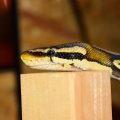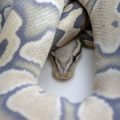Table of Contents
Turning into a snake person or already is? Ball pythons will definitely be a great pet snake to have. Even if you are not fond of snakes, these smooth, gorgeous, and sleek snakes; with a personality of gentleness, friendliness; and calmness, and based on how comparatively low maintenance they are; will not keep your hands occupied since they are very neat and clean. They will definitely turn you into one snake enthusiast, even before you know it. Not only are they popular in most countries; but they are really advisable by experts if you want to have your own pet snake since they are really not harmless.
If we have convinced you by just a short introduction of ball pythons; maybe it’s time for you to tune in to know what the diet of these snakes is. If you are just a beginner, this will serve as a guide to raising your ball python’s right.
General Rule of Feeding Ball Pythons
Ball pythons just like any other snakes eat with a variety. They eat diverse sizes of prey in tune with how big they are. Normally, the young and small ball pythons eat small frozen feeder mice or rats. While older and bigger ball pythons eat larger mice or rats.
You should plan their feeding needs in accordance with their current size. The smaller your ball pythons are, the harder it is for them to swallow and digest their foods. The general rule often being preached by experts is that their prey should be in proportion; or slightly larger to the widest side of their body and they do not have to be fed every day, religiously.
Where to find food for them?
Pet stores are likely to have food for your ball pythons. You can rely on that varying sizes of mice are often stocked up for your ball python, or; you can always start breeding mice for readily available food for them. If you are thinking of just capturing wild mice, drop that thought because wild mice may have lice, ticks; and parasites that will put you and your pet snake in harm and hazard.
Going Vegetarian?
While some snake owners might think about having their ball python’s vegetarian diet, it is really not advisable. Conditioning your snakes to just eat eggs or insects instead of rodents; and mammals is not nutritious and would not fulfill their nutritional needs. Moreover, a vegetarian diet on ball pythons will just work temporarily. It is important to know as well that snakes do not benefit from aiding this by nutritional supplements; rather what they need and must have is proper nutrition from their proper diet.
Getting started
Remember that it is best to feed your ball pythons with whole mice or rodents; their whole entirety will supplement your snake with essential vitamins, minerals; and nutrients that are aiding their growth and healthy well-being. Besides the usual mice and rodents, you can diversify your ball python’s diet by adding chicks, quails; hamsters, gerbils, and guinea pigs into feeding them.
It is crucial that you kill their prey first before serving them; even the smallest prey can fight for their lives that can cause scratches in your snake; that can quickly form an infection that could be hazardous and deadly to your snake.
Pet stores will likely sell pre-killed preys and dead preys afterward should be stored in a freezer. Before feeding, their prey should be fully thawed, and then you are good to go.
If you have a young ball python that is having a hard time eating a dead prey and seems to withdraw from it; you can condition them into liking it by feeding them first of pre-killed prey; wiggling it near your snake to have a grasp of movement before it feasts onto it. After a few of these, your snakes will in no time be used to eating already dead prey.
How often should you feed them?
You are encouraged to stick to the age-appropriate feeding schedule. Young ball pythons need to be fed one to two times per week, older ball pythons can just eat once a week. These snakes like to eat their prey at night; hence it is best for them to eat at night because it is their most active state and when they are most ready to attack their prey. Assuming that feeding is successfully done, digestion of prey will take place that takes typically four to five days. Snakes are encouraged as well to be kept in a warm and dark spot because it helps with smoothing their digestion. Lastly, defecation will take place indicating that the digestion phase is completed. After successful defecation, you ought to wait a day or two before feeding them again.
While this feeding schedule is optimum, slightly randomizing and altering the feeding schedule will stimulate how your snake feels in the wild and that can aid in a much healthier diet pattern.
Conclusion
Keep in mind that a healthy and appropriate diet is as crucial as any other form of care you are ought to give to your ball python. This holds a lot of importance because food is their fuel to life and mastering effective feeding for them will maximize their health and well-being. Moreover, always practice responsible pet ownership and always find ways to educate yourself to show up for your snake/s in the most effective and efficient way and you will just be surprised that in no time, you have turned into a great snake enthusiast.





 Author and long-time animal lover. Sharing knowledge on pet care through experience and the written word.
Author and long-time animal lover. Sharing knowledge on pet care through experience and the written word.